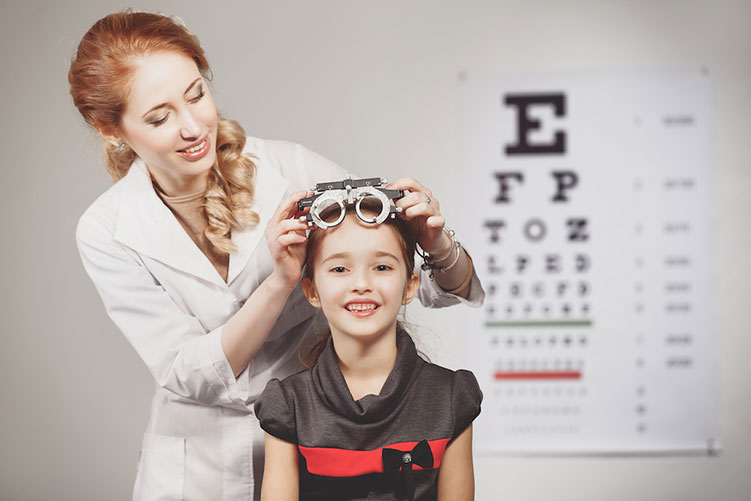Vision Therapy
Vision therapy is similar to physical therapy, but instead of a joint or muscle, it works with the eyes and brain. There is a neurological component with this kind of therapy because the eyes are an extension of the brain. Our eyes help make “seeing” possible, but vision is reliant on the eye-brain connection. If either of these organs are not working properly, vision will be difficult or non-existent.
What Does Vision Therapy Treat?
Every patient is different, but vision therapy is most commonly a treatment option for amblyopia (“lazy eye”), strabismus (“crossed eyes”), and binocular vision problems with eye alignment. It may also treat eye movement disorders, focusing disorders, or other visual deficiencies related to eye strain or fatigue. Vision therapy can address problems derived from stroke or brain injury, too. The earlier problems are caught and treated, the more likely they are to be fixed. For this reason, vision therapy is often used for children, because they adapt better to changes and visual exercises. This doesn’t mean adults can’t benefit from vision therapy in certain situations. Parents who bring their child in for an eye exam during their infancy greatly reduce the risk of their child developing any vision related learning disorders.

When Do I See a Doctor About Vision Therapy?
Any time you feel your eyes or your child’s eyes are not performing properly, you should seek medical attention. Children should receive an eye exam even as babies, and again before they enter school. Eye exams check for more than clear and accurate vision. For this reason, everyone should receive periodic exams to ensure their eyes are healthy. If you notice any changes in your sight or think your child is not developing properly, seek help right away.
If you have questions click contact us or click here to request an appointment today.
Contact Info
Phone: 623-937-1655
Text Us: 623-937-1655
Hours
- Monday
- 8:00am - 5:00pm
- Tuesday
- 9:00am - 6:00pm
- Wednesday
- 8:00am - 5:00pm
- Thursday
- 8:00am - 5:00pm
- Friday
- 8:00am - 5:00pm
- Saturday
- 8:00am - 12:00pm*
- Sunday
- Closed
Closed for lunch from 12:00pm - 1:00pm
*Closed the last Saturday of every month
Terapia Visual
La terapia visual es similar a la terapia física, pero en lugar de una articulación o músculo, funciona con los ojos y el cerebro. Esta terapia tiene un componente neurológico porque los ojos son una extensión del cerebro. Nuestros ojos ayudan a que sea posible “ver”, pero la visión depende de la conexión de ojo-cerebro. Si alguno de estos órganos no funciona correctamente, la visión será difícil o inexistente.
¿Qué trata la terapia de la visión?
Cada paciente es diferente, pero la terapia visual es comúnmente una opción de tratamiento para la ambliopía (“ojo vago”), el estrabismo (“ojos cruzados”) y los problemas de visión binocular. También puede tratar trastornos del movimiento ocular, trastornos de enfoque u otras deficiencias visuales relacionadas con fatiga o tensión ocular. La terapia visual también puede ayudar con problemas relacionados con un accidente cerebrovascular o una lesión cerebral. Es importante diagnosticar y dar tratamiento lo más pronto posible con estas condiciones. Los padres que llevan a sus hijos para examen oculares anualmente y durante su infancia reducen el riesgo de que tendrán trastornos de aprendizaje relacionado con la visión.

¿Cuándo veo a un médico sobre la terapia de la visión?
Cuando vea o sienta que los ojos de sus hijos no están funcionando correctamente, deben buscar atención médica. Los niños deben recibir un examen de la vista cuando son bebés y nuevamente antes de ingresar a la escuela. Si nota algún cambio en su vista o cree que su hijo no está desarrollando adecuadamente, busque ayuda de inmediato.
Si tiene preguntas, haga clic en contáctenos o haga clic aquí para solicitar una cita hoy.
Cómo localizarnos
Teléfono: 623-937-1655
Textear: 480-372-8697
Horas
- Lunes
- 8:00am - 5:00pm
- Martes
- 9:00am - 6:00pm
- Miércoles
- 8:00am - 5:00pm
- Jueves
- 8:00am - 5:00pm
- Viernes
- 8:00am - 5:00pm
- Sábado
- 8:00am - 12:00pm*
- Domingo
- Cerrado
Cerrado durante el almuerzo 12 – 1
*Cerrado el último sábado de cada mes